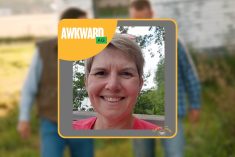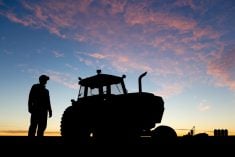Growing up I wanted to farm.
I laugh now because what I defined as farming when I was young is not even identifiable in today’s operations: sleeping behind the seat of grandpa’s combine, driving the farm truck when I couldn’t reach the pedals and sitting shotgun in the grain truck with no air conditioning.
This is the lifestyle that I remember. It is also the lifestyle that the next generation will most likely never know. The family farm has become a dynamic and complex business. For those who still hold on to the “old ways,” the landscape is becoming smaller and smaller by the day.
Read Also

How scientists are using DNA and climate data to breed crops of the future
A method for forecasting how crops will perform in different environments so that plant breeders can quickly select the best parents for new, climate-resilient varieties.
In fact, consolidation over the next decade will most likely turn that style of farming into photographs on the wall. Whether we all agree on the timeline or not, consolidation in every sector occurs as margins tighten and the ability to earn a living becomes necessary for growth.
It doesn’t even have to be called “large corporate farming.” We could just say that tomorrow’s farms will be bigger than farms today.
So, what does this mean for those who want to grow in this industry?
Some choose to look at the future as a glass half-empty. I choose to sell the glass and make money. (This is a running joke in entrepreneurial circles.) What that means is that there are unlimited opportunities for those who choose to see possibilities.
Farms of the future will require skill sets that historically haven’t been considered in primary producer operations. Instead of learning agronomy, we will learn technology; instead of operations, we’ll learn negotiating and business. For those who want to be involved in the farm, there have never been more opportunities.
My business partner, Jeff, and I spoke at an agriculture college a couple of years ago about the precision agriculture tools we use on the farm. The 40 students were a mix of farmers and urbanites, but all were interested in precision agriculture. We came away with two lessons that I speak about to this day: one, as farmers, we have done a poor job selling our story. None of the students realized the amount of technology used on farms today.
And two, farms are in trouble because only one of those students saw a career in primary producer agriculture.
Unlike many others in our industry, I don’t see consolidation as a negative. I see it as an opportunity for farms to create jobs for the next generation like never before.
The past was always about taking over the farm. Now, it’s about what do you want to do on the farm? The ownership role no longer consists solely of the CEO. A farm owner can be the technology specialist, the agronomist, the lead mechanic. We don’t have to force the next generation into a position that they may not want. They can own the company but do the jobs that fit their abilities.
Agriculture has not always been a cheerleader for change, but I consider this a step forward. And I will admit that I have hit the age where a new phone or a change in computer programs, or even road construction that changes my drive home, makes me anxious.
But we are becoming an industry where the next generation doesn’t learn in textbooks: they learn in Instagram clips. They don’t work with their hands in the dirt: they wear designer jeans and collared shirts. Our industry needs to adjust. There are not enough farm kids to fill the labour void in this industry.
We need to start selling the farm as a great place to work, not just a great place to grow up.















